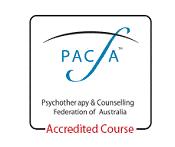Graduates are equipped with counselling knowledge and skills to work ethically and professionally in the helping professions.
Studies present a traditional and contemporary approach to counselling. Courses include psychology, counselling theories and skills, cultural diversity and specialist areas such as family therapy and trauma and crisis counselling.
- Only a full-time option is available to international students on a Student visa. Online programs are not available to Student visa holders.
- * Estimated tuition fees are based on 2025 rates. Refer to international fees for more information.
- Not all majors/minors and elective options are available at every campus. You should refer to the What Can I Study tab, and the proposed study sequence for your chosen campus and intake for further information.
Studies present a traditional and contemporary approach to counselling. Courses include psychology, counselling theories and skills, cultural diversity and specialist areas such as family therapy and trauma and crisis counselling.
Post-admission requirements
Students must complete two internship placements at approved agencies. A Suitability Card (Blue Card CCYPCG) is required — refer to Program requirements.
Career opportunities
Mental health, welfare work, aged services, child protection, disability services, counselling individuals, families and groups, youth.
Membership
 Australian Counselling Association; Australian Community Workers Association; any counselling membership association approved by the Psychotherapy and Counselling Federation of Australia.
Australian Counselling Association; Australian Community Workers Association; any counselling membership association approved by the Psychotherapy and Counselling Federation of Australia.
Accreditation
Psychotherapy and Counselling Federation of Australia; Australian Community Workers Association; Australian Counselling Association
Program structure
Program requirements
In order to graduate you must:
- Complete 1 required core course
- Complete 5 required introductory (100 level) courses.
- Complete 14 required advanced (200/300 level) courses.
- Complete 4 elective courses.
- Successfully complete 2 field education placements (COU263 and COU264 ).
- Complete no more than 10 introductory level courses, including the core course.
- Complete no more than 6 courses from the School of Business or Faculty of Science, Health, Education and Engineering.
- Register any selected Majors or Minors with Student Administration.
In order to commence field education placement you must:
- Hold a valid Suitability Card (Blue Card), throughout the duration of your program, which is issued by the Commission for Children and Young People and Child Guardian (CCYPCG). You should allow 12 weeks for CCYPCG to issue the card. Note: students who do not possess a valid Blue Card will be unable to complete the field education component of their program and will be unable to meet graduation requirements.
- Have a National Criminal History check (by Queensland Police Service or other state/territory authority).
- Travel to attend field education placements.
- Please note, while all endeavours will be made to place students in a given semester, this is not guaranteed and students may need to enrol at a later time should a position in an agency be unavailable in the preferred semester.
Program notes
- Completing this program within the specified (full-time) duration is based on studying 48 unit points per semester (normally 4 courses).
- Electives may be used to complete and additional major or minor to supplement the required major.
- Courses within this program are assessed using a variety of assessment methods including essays, seminar presentations, reports, in-class tests and examinations. Not all courses will necessarily include all methods.
- As part of your USC program, you may apply to participate in the Global Opportunities (GO) Program to undertake courses with an overseas higher education provider. It is advisable to contact your Program Advisor to discuss timing and course issues.
- Only a full-time study option is available to international students on a Student Visa.
- Refer to the English language requirements.
- When enrolling, refer to the Study Plan.
Program structure
Core courses (1)
1 core courses from:
COR109 Marine Vertebrates: Sharks, Seabirds, Fish, Turtles and Whales
Introductory courses (5)
5 required courses:
COU101 Biodiversity and Ecology
COU180 Science Research Methods
PSY100 Discovering Science
PSY101 Cell Biology
SCS130 Introductory Bioscience
Advanced courses (14)
14 required courses:
COU200 Communication and Thought
COU261 Theories and Systems of Counselling and Psychotherapy
COU262 Counselling for the Human Services Professional
COU263 Introduction to Psychology A
COU264 Introduction to Psychology B
COU265 Introduction to Indigenous Australia
COU276 Relationship Counselling
COU281 Counselling Development and Supervision 1
COU300 Counselling Development and Supervision 2
COU301 Counselling Placement 1
PSY203 Counselling Placement 2
SCS225 Strengths Based Counselling: Collaborative Approaches
SCS278 Group Processes and Practice
SCS290 Developmental and Family Counselling
Elective courses (4)
Select 4 elective courses
Up to 4 electives may be from either faculty (Arts and Business or Science, Health, Education and Engineering).
TOTAL UNITS 288
